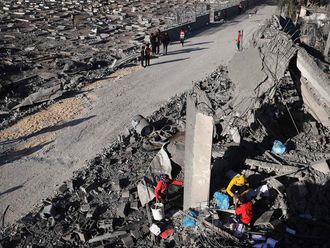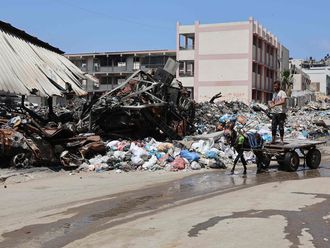Ramallah: Gaza based contractors involved in the rebuilding of the coastal strip halted all construction operations on Thursday, vowing to continue their strike until the Hamas Ministry of the Economy reverses its most recent decision to impose extra fees on construction materials entering the strip.
On Tuesday, the ministry imposed extra fees of three shekels on aggregate, five shekels on ready mix concrete and 10 shekels per tonne on construction iron.
From the moment the new fees were enacted, contractors declined to accept any construction materials and suspended all construction in various areas of the strip.
“This morning we held a meeting with the Gaza Ministry of the Economy to discuss the issue and reach an agreement,” said Osama Khail, who heads the Palestinian Union of Contractors in Gaza.
“The Ministry must at least waive the fees for projects which are already underway; fees can later be imposed on new projects,” Khail told Gulf News. “As contractors, we will not be able to stand the loss if this decision is implemented for projects already in progress.”
Construction materials are brought from Israeli suppliers. When the Gaza Ministry of the Economy imposed the fees on these suppliers, they in turn passed them on to the local contractors in Gaza, warning that if they were not paid, no materials would be supplied.
“The moment the Ministry imposed the new fees the suppliers increased their prices, which was never agreed to in our contracts with them,” Khalil explained.
The Ministry took its decision without any consultation with the relevant Gaza-based contractors, and Khalil believes their decision will have serious long-term consequences.
“The private sector in the Gaza Strip is already on its last breath,” he said. “Less than 20 per cent of the rebuilding work needed in Gaza after three years of war between Hamas and Israel has been completed,” he added. “The economic condition in the Gaza Strip is catastrophic and on the verge of explosion at any moment.”
Khail blasted the Gaza Reconstruction Mechanism (GRM), the agreed upon temporary agreement (valid for six months) which controls the flow of machinery and construction materials into Gaza, describing it as the main hindrance to the rebuilding of the isolated coastal territory.
“As per the GRM, it takes up to seven months to approve a minor construction project,” Khalil complained. “Gazan contractors must keep their warehouses under strict, round-the-clock camera surveillance to monitor construction materials. Contractors are punished for the inevitable power cuts which cause the cameras to stop functioning. Reports are issued to the Israelis, and it takes about a year for a contractor to clear his name.
“In addition, Israel has, without grounds, suspended and revoked the permits of more than 200 contractors and suppliers,” he added. “Israel is exerting every effort to fight the rebuilding of Gaza, and an international stand is urgently needed.”
Around 75,000 Gazans are still displaced from their homes, as a $3.5 billion (Dh12.86 billion) effort to rebuild Gaza from the destruction of the war creeps along at a pace officials say has fallen years behind schedule.
Israeli, Palestinian and international officials worry that the economic and humanitarian plight in the isolated coastal territory will ensure continued instability, and that a new war may only be a matter of time. Last year, the United Nations warned that Gaza may become uninhabitable by 2020 if there is no change in the economic situation.












